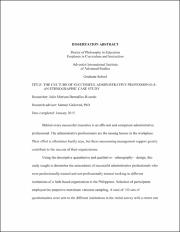| dc.description.abstract | Behind every successful executive is an efficient and competent administrative
professional. The administrative professionals are the unsung heroes in the workplace.
Their effort is oftentimes hardly seen, but these unassuming management support greatly
contribute to the success of their organizations.
Using the descriptive quantitative and qualitative—ethnography—design, this
study sought to determine the antecedents of successful administrative professionals who
were professionally-trained and not-professionally trained working in different
institutions of a faith-based organization in the Philippines. Selection of participants
employed the purposive maximum variation sampling. A total of 130 sets of
questionnaires were sent to the different institutions in the initial survey with a return rate
of 81.5% (106). After which, the 15 best-rated participants were identified based on the
selection criteria. The qualitative data were collected using interviews and observation.
Findings indicated that in the Philippines, 60% of the administrative professionals
working in different institutions of this faith-based organization have office
administration degrees while 40% have other degrees. Findings also revealed that the
successful administrative professionals who comprise the main part of this study possess
the 21st century work requirements. They have the desired level of education and they
have excellent qualities and skills. They occupy positions of trust as office secretary,
administrative secretary, or administrative assistant. These administrative professionals
play a vital role in their workplaces and are very valuable in their organizations according
to their executives. Although the type of education does not really matter in their being
successful based on their performance evaluation and qualities and skills assessment by
their executives, these professionals recognize the importance of continuing professional
development and training in related field to stay current on the job and to meet the
demands of their work.
Conclusions based upon the findings of the study include that the professionals
are successful because they have the character (qualities), the competence (skills), and the
connection (active learning and excellent relationship with God and with men). They
have high core self-evaluation and are satisfied and happy with their jobs. However, they
wish to have their rate and title reviewed to match with their responsibilities and the role
they play in their workplaces. Recommendations included how colleges can improve the
office administration offerings to help students become better administrative
professionals and attract more students to go into the profession. | en_US |

